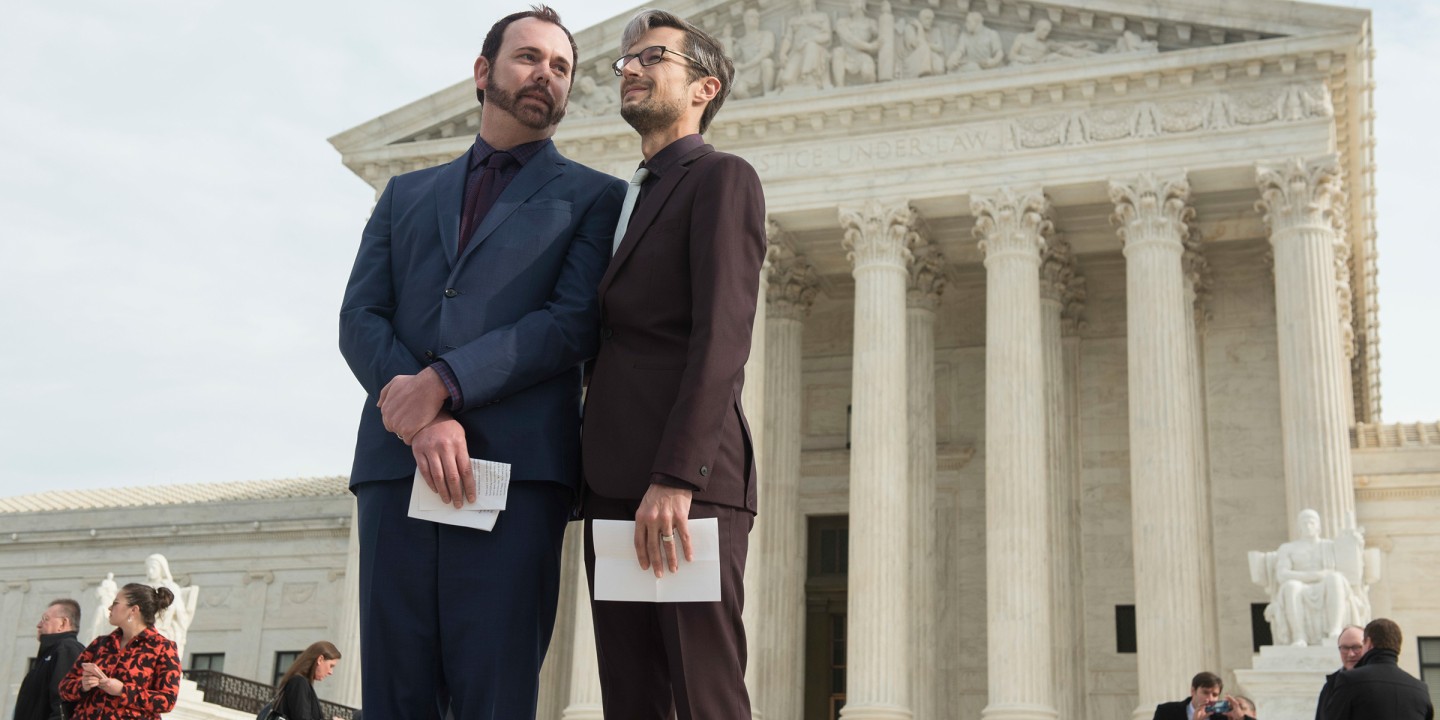Supreme Court weighs whether baker may refuse to serve same-sex couple
In the Masterpiece Cakeshop case, justices are considering whether creative work—like decorating a cake—is protected free speech.

What if an atheist baker refused to bake a cake for a First Communion party?
What if a college with a religious affiliation didn’t want to rent out its chapel to a gay couple?
What if a makeup artist didn’t want to ready a gay couple for their wedding?
At the Supreme Court on December 5, the justices lobbed hypotheticals at the lawyers representing each side of Masterpiece Cakeshop v. Colorado Civil Rights Commission, a case about free speech and religious rights.
No one on either side of the dispute doubts that Colorado baker Jack Phillips’s Christian convictions drove his 2012 decision to refuse to bake a custom wedding cake for Charlie Craig and David Mullins. Phillips will sell gay people cupcakes, brownies, and birthday cakes, but because he believes gay marriage is a sin, he won’t bake cakes for their weddings.
The Colorado Civil Rights Commission called that stance discrimination, and the Colorado Court of Appeals agreed. Phillips is hoping the Supreme Court will give a different answer.
Phillips said outside the court after his case had been heard that the government wants him to choose between his business “and violating my relationship with God.”
Inside the court, lawyers representing the couple said the state of Colorado merely insisted that the baker abide by its Anti-Discrimination Act, which requires businesses to treat all customers equally, regardless of race, gender, disabilities, or sexual orientation, among other categories.
Read our latest issue or browse back issues.
Phillips is free to express his opinions regarding gay marriage, but businesses can’t allow those opinions to justify discrimination against gay people, said David D. Cole, the national legal director of the American Civil Liberties Union, who argued on behalf of Craig and Mullins.
“To do that would be to constitutionally relegate gay and lesbian people to second-class status, even when a state has chosen, as Colorado has done here, to extend them equal treatment,” Cole told the court.
Phillips’s attorney appealed to the justices to protect his right to free speech, the right that “protects the lesbian graphic designer who doesn’t want to design for the Westboro Baptist Church as much as it protects Mr. Phillips,” said Kristen K. Waggoner, senior vice president of the legal division of the Alliance Defending Freedom, referring to the Kansas congregation known for its inflammatory protests.
As in other recent cases with religious overtones, Anthony Kennedy played his customary role as the justice whose vote could likely decide the case. And, as usual, Kennedy offered each side reason for hope. He fretted about Phillips’s behavior toward gay people, but he also sensed among Colorado officials a “hostility to religion.”
Justice Neil Gorsuch noted that part of the Colorado Civil Rights Commission’s remedy was for Phillips to instruct his staff on the antidiscrimination law he violated. Gorsuch wondered whether that flouted the baker’s rights.
“Why isn’t that compelled speech and possibly in violation of his free-exercise rights?” Gorsuch said. “Presumably he has to tell his staff, including his family members, that his Christian beliefs are discriminatory.”
All he had to do was instruct his employees on the law, replied Frederick R. Yarger, Colorado’s solicitor general, who, with Cole, defended the commission. “It has nothing to do with a particular person’s belief.”
Here Kennedy seemed to side with Gorsuch. “Part of that speech is that state law, in this case, supersedes our religious beliefs, and he has to teach that to his family. He has to speak about that to his family . . . his family who are his employees.”
Justice Ruth Bader Ginsburg made an interjection.
“His belief is his belief,” she said. All Phillips has to do is instruct them to say that “this is what the law of Colorado requires.”
Much of the back-and-forth between the justices and the lawyers explored whether Phillips, as a baker, could claim a violation of his speech rights. Justice Samuel Alito, who has said he is concerned about the state of Americans’ religious liberty, tried to clarify the question with another hypothetical: that of a person hired to write wedding vows for others. What if a couple wanted to include language expressing that “we don’t believe in God, we think that’s a bunch of nonsense, but we’re going to try to live our lives to make the world a better place.”
Imagine, Alito continued, that “the person who is writing this is religious and says: I can’t lend my own creative efforts to the expression of such a message.” Would you say, Alito asked Cole, “too bad because you’re a public accommodation. Am I right?”
The case is not parallel, said Cole, and were it to arise, “it would certainly be open to this court to treat it differently.”
As he closed his argument before the court, Cole warned against carve-outs for those who say their religion trumps antidiscrimination law.
“Once you open this up, once you say generally applicable regulations of conduct have exceptions when someone raises a religious objection, or in this case have objections where someone raises a speech objection, you’re in a world in which every man is a law unto himself.”
The court is expected to rule on the case in early summer. —Religion News Service
A version of this article appears in the January 3 print edition under the title “Supreme Court weighs whether baker may refuse to serve same-sex couple.”





